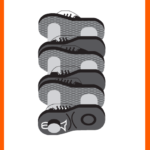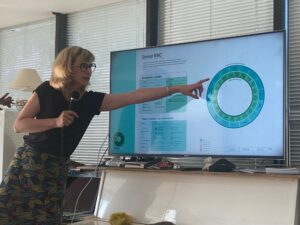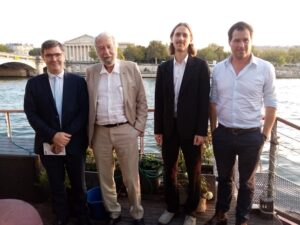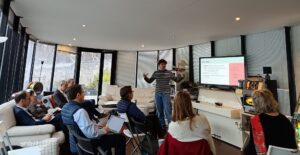Crisis of the impossible
Crisis of the impossible
The Prime Minister wants cars to carry at least three people.
She has instructed her chief of staff to pull off this feat.
No easy task for Julien!
“So Julien, have you found a solution?”
“Madam Minister, it’s not quite so simple.”
“Einstein said that a problem without a solution is a poorly posed problem,” replies Beth Bacon. If we don’t have a solution, we pose the problem again. You’ve had time to do it. A cabinet shuffle has been announced. I need a stroke of genius!”
Julien likes geniuses. They open up infinite space where ordinary mortals set limits that cannot be crossed. He is less keen on strokes of genius, especially in politics. Too often they turn out to be solublems, i.e. solutions that create more problems than they solve.
“So we have a problem and I’m waiting for the solution,” says Beth, jogging into her office.
The minister has turned her office into a gym. She walks, runs, and pedals during meetings.
“Today there is one person in 80% of cars,” says Julien. “Your services think that cars should carry three people. This would avoid traffic jams and thereby reduce CO2 emissions. On the other hand, for them, it’s a bit too soon…”
“Soon? It’s always too soon before it’s too late. I bet your technicians reckon the objective could be reached by 2050. This will give them time to twiddle their thumbs while lamenting over climate disasters,” says Beth Bacon as she speeds up.
“I’m sorry, but all the studies agree that it’s impossible.”
Beth stops, glares at her chief of staff, then punches a boxing bag screaming:
“Impossible is a refuge for cowards. It’s the wild card for those who only take risks when there is a 100% chance of success. It’s the alibi for those who want to keep their backsides stuck to their chairs. Do you know Bertrand Piccard?”
Julien shrugs. Of course he knows the Swiss Jules Verne. He followed his round-the-world journeys by balloon and plane.
“When the explorer said he was going to go around the world in a solar plane, flying day and night, how do you think civil servant-engineers reacted?”
“I don’t know,” mutters Julien.
“They laughed and explained it was impossible to build a solar plane. When the plane was built, they laughed and insisted it was impossible for the Swiss explorer to pull off this around the world feat. When he won his bet, they forgot it was impossible. In turn, they wanted to build planes that could fly around the world with zero fuel.”
“Of course, the Swisspiration doesn’t get nowhere fast,” says Julien watching his boss fired up on an exercise bike.
“The Swisspiration, as you call him, has dreams greater than his fear of failure. By daring the impossible, he’s changing the world.”
Julien is surprised. It is so rare his boss speaks positively. He wonders if she has been hypnotised by the psychiatrist-explorer. Well, she isn’t under for very long. The minister starts running again, saying:
“I gave you all the resources to try things out. I hope your incubators were fired with creative flames.”
A real downer – that’s how Julien labelled the first experiment. The idea was to make solo drivers feel guilty. Invited to an event, his teams weighed on their conscience all the deaths linked to climate disasters. They were overwhelmed by the tears of mothers who had lost a child in the cataclysms and the despair of those who had nothing left. Adolescents challenged them by accusing them of sacrificing future generations. They compared these drivers to executioners guillotining their own children.
“Our discourse hit the nail on the head. The next day, none of the participants drove their cars alone,” concludes Julien.
“Perfect. You write me the speech. No spineless talk. I want punch, energy. Well then, the matter’s settled.”
“It’s not that simple, stammers Julien. “When they returned home, the participants drank to forget. The next day, they had drunk so much they forgot to go to work. The day after, they drove alone in their cars.”
Beth punches the boxing bag. She knows that humans go deaf when subjected to words they don’t want to hear. Nevertheless, she had briefly hoped that a depressing speech might suffice to change behaviour habits.
Julien called the second experiment ‘Sheep and company’. It is based on the social norm by which people change their behaviour to abide by the rules of their community.
“To enhance the value of drivers with several passengers, we used a device with big ears.”
“Big ears! You came up with a device that spies on and denounces bad drivers.”
“It’s far more subtle.”
On discovering the device, Beth Bacon has her doubts. Thanks to an arsenal of mad technology, solo drivers are given big ears through augmented reality.
“Julien, you’re not serious?” asks the minister. “We’re not going to stigmatise drivers who travel alone in their cars!”
“Experts reckon the ‘peer effect’ is amazingly efficient.”
“Julien, how many times do I have to tell you that an expert is a someone who has stopped thinking?” says the sportswoman, stopping her running for a few moments.
“It’s just that…”
The minister gestures for Julien to forget his ‘Sheep and company’. If she bleats in this field, the wolves will gobble her up in a single mouthful.
“I told you to ask the garage guys to come up with something,” says the lady.
“They designed 3car. The car only starts when three people are on board.”
“Much better than stigmatising bad drivers. I approve it.”
“ It’s just…. It’s not that simple,” grumbles Julien.
“Julien, stop saying ‘it’s not that simple’. It doesn’t always have to be complicated.”
“Some drivers discovered that the system was based on the minimum weights on seats. So to start their cars, they put bricks on the seats.”
The runner sprints to release her adrenaline. A good technocrat, she would have welcomed a technology-based measure that changed driver behaviour.
“Another avenue we also explored was the nudge approach.”
Julien explains that nudging is a kind of ‘helping hand’. It is the flick that makes people switch their habits without constraints. The most well-known is the urinal fly in the men’s toilets at Amsterdam’s Schiphol Airport. Men try to target it so cleaning costs have dropped by 80%.
“Our nudge is basic. When there are three people in a vehicle, the road tolls are three times cheaper.”
“It’s really quite simple, but someone had to think of it. I hope you’re not going to tell me it’s not that simple.”
“It’s just… Yes, I am.”
Julien explains that from day three, unemployed people were riding in the cars of solo drivers. The drivers would give them a coin or two and thus make sizeable savings.
On hearing her chief of staff, Beth leaps over a coffee table piled with documents.
“So you don’t have a solution. For six months your teams have been working on this issue to finally achieve nothing.”
“Our discussions have led to an idea: we must ban driving alone in a car.”
This stops our office athlete dead in her tracks.
“Julien, come back to earth. With this measure I’ll trigger an unprecedented crisis. After that, I can wave goodbye to being part of the new team.”
“Crises can have a positive impact, both on the individual and the community. They make it possible to turn the page…. That’s what Bertrand Piccard says.”
“Julien, so sweet of you for this advice. Just the chaos it would cause,” says Beth.
“In the thermodynamics of fluids, chaos theory states that a disorder generates a higher quality order,” retorts Julien.
Beth Bacon shifts forwards, backwards. Triggering a crisis would mean having to overcome it and therefore sort out the problem, or even consider others for reducing global warming. But it would also mean sitting on an ejector seat.
“Impossible,” she finally says. “The President will never accept it.”
“I thought the impossible was the refuge of cowards and the wild card for people who sit around on their backsides all day,” retorts Julien.
Beth Bacon is annoyed. She embarks on a breathless marathon that prevents her from answering. Is the minister going to cause a government heart attack or ensure she remains in the running? On leaving the office, Julien doesn’t know. He only knows that the impossible is something really worth thinking about.




